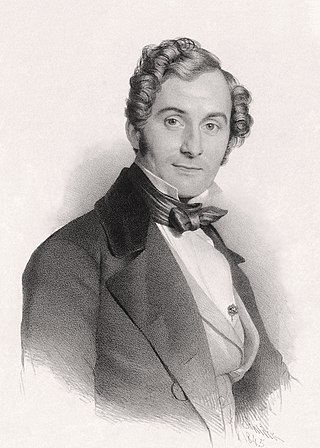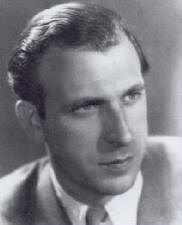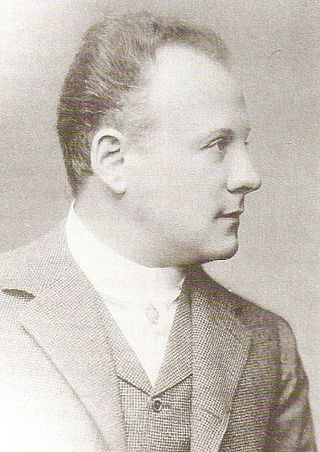
Gustav Albert Lortzing was a German composer, librettist, actor and singer. He is considered to be the main representative of the German Spieloper, a form similar to the French opéra comique, which grew out of the Singspiel.

Hans Hotter was a German operatic bass-baritone. He stood 6 feet 4 inches (1.93 m) and his appearance was striking. His voice and diction were equally recognisable.

A soubrette is a female minor stock character in opera and theatre, often a pert lady's maid. By extension, the term can refer generally to any saucy or flirtatious young woman. The term arrived in English from Provençal via French, and means "conceited" or "coy".

Die lustigen Weiber von Windsor, or The Merry Wives of Windsor, is an 1849 opera in three acts by Otto Nicolai to a German libretto by Salomon Hermann Mosenthal based on Shakespeare's play. Published as a comical-fantastical work in three acts with dance (komisch-phantastische Oper in 3 Akten mit Tanz), its structure is musical numbers linked by spoken dialogue, harkening back to the then-outmoded Singspiel format. It remains popular in Germany and Austria and its overture is sometimes heard in concert in other countries.

Moses und Aron is a three-act opera by Arnold Schoenberg with the music to the third act unfinished. The German libretto is by the composer after the Book of Exodus.

Fierrabras, D 796, is a three-act German opera with spoken dialogue written by the composer Franz Schubert in 1823, to a libretto by Joseph Kupelwieser, the general manager of the Theater am Kärntnertor. Along with the earlier Alfonso und Estrella, composed in 1822, it marks Schubert's attempt to compose a grand Romantic opera in German, departing from the Singspiel tradition. It had to wait until 1897 for a (relatively) complete performance.

Prince Konrad of Bavaria was a member of the Bavarian Royal House of Wittelsbach.

Zar und Zimmermann is a comic opera in three acts, music by Albert Lortzing, libretto by the composer after Georg Christian Römer's Der Bürgermeister von Saardam, oder Die zwei Peter, itself based on the French play Le Bourgmestre de Saardam, ou Les deux Pierre by Mélésville, Jean-Toussaint Merle, and Eugène Centiran de Boirie. Ultimately, it goes back to the historical Grand Embassy of Peter the Great. Gaetano Donizetti had set the same story in his 1827 opera Il borgomastro di Saardam.

Undine is an opera in four acts by Albert Lortzing. The German libretto was by the composer after Friedrich de la Motte Fouqué's novella of the same name.
Robin Hood is a comic opera by Reginald De Koven (music), Harry B. Smith (lyrics) and Clement Scott. The story is based on the Robin Hood legend, during the reign of King Richard I. The opera was composed in Chicago, Illinois during the winter of 1888-1889.

Das Käthchen von Heilbronn oder Die Feuerprobe (1807–1808) is a "great historical knightly play" in five acts by the German playwright Heinrich von Kleist. The action of the drama takes place in Swabia during the Middle Ages.

The Liebenau monastery was a Dominican monastery. It was located outside the city gates of Worms in today's Worms-Hochheim district.

Helga Pilarczyk was a German operatic soprano.

Felix Decken ) was a German operatic buffo tenor, actor and stage director.

Paul Bender was a German operatic bass.

Minna Lammert, also Minna Lammert-Tamm and Minna Tamm, was a German operatic mezzo-soprano. For decades a singer of the Hoftheater in Berlin, she appeared in the first complete performance of Wagner's Der Ring des Nibelungen at the first Bayreuth Festival in 1876 as one of the Rhinemaidens.
Lotte Schädle is a German soprano in opera, operetta, lied and concert. She was a member of the Bavarian State Opera and the Staatstheater Nürnberg, and has performed at international opera houses and festivals, in roles such as Blonde in Mozart's Die Entführung aus dem Serail.

Die Opernprobe, also titled Die vornehmen Dilettanten, is a comic opera (Spieloper) in one act by Albert Lortzing, to a libretto which he adapted from a play by Philippe Poisson which had been translated by Johann Friedrich Jünger. The premiere was on 20 January 1851 at the Oper Frankfurt.

Johann Baptist Hoffmann was a German operatic baritone and voice teacher. A long-term member of the Berlin Court Opera, he performed leading roles in Europe, such as Verdi's Rigoletto and Wagner's Dutchman in Der fliegende Holländer. He took part in several world premieres in Berlin.
Margarete Düren or Margarethe Düren-Herrmann was a German operatic soprano. She was based at the Staatsoper Stuttgart until 1939, where she appeared in the world premiere of Nico Dostal's operetta Monika, in the title role. With her husband Josef Herrmann she moved on to the Semperoper in Dresden and further to Berlin. They appeared and recorded together. After his death, she moved to Cologne, where she served as a prompter until age 89.
















